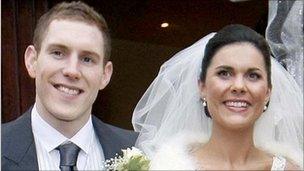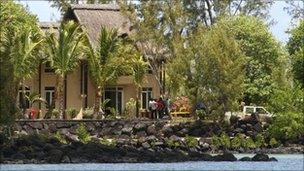How will the Mauritian justice system deal with the murder of Michaela McAreavey?
- Published

Michaela Harte married John McAreavey on 30 December
The murder of Michaela McAreavey on Mauritius has thrust the peaceful and relatively prosperous island nation into the media spotlight.
The country's prime minister has said the crime has made him consider reintroducing the death penalty.
So how will the country's legal system deal with the three men charged in connection with Mrs McAreavy's murder?
Although it gained independence in 1968, Mauritius has a legal system heavily influenced by its colonial past. Between 1715 and 1810 the island was a French possession and as such was ruled according to French Law.
The Napoleonic Code, also known as the French Civil Code, was introduced after 1804 and when the British won possession of the island from the French in 1810 that legal system was kept in place.
Over the years of British rule elements of English common law were adopted and the current legal system is a combination of French and English systems. Mauritius is still a member of the British Commonwealth and the country's supreme court of appeal is the Privy Council in London.
The Indian Ocean country is recognised by the Organisation for Economic Cooperation and Development, external (OECD) as a "stable democracy with regular free elections, a free press, the rule of law and a positive human-rights record".
''Judicial inquiry"
The suspects accused of murdering Mrs McAreavy could be held on remand for up to a year as the police and prosecutors build a case against them.
Ashveen Gopee, a barrister on the island, said once police believe they have enough evidence against an arrested person, they would lodge a provisional charge of murder at a district court.
The case is heard by a magistrate, who is a trained lawyer, not a lay person.
"Bail acts are also similar to British law so the person would probably be denied bail," said Mr Ashveen.
"A judicial inquiry will then be carried out by police officers and the case will be called back by the magistrate at different stages to see how the investigation is continuing."

A section of the Legends Hotel where the body of Michaela McAreavy was discovered
A formal charge of murder, or a lesser charge, is lodged against the person in a follow-up hearing.
On occasion, a magistrate will strike out a case over a lack of evidence against a suspect.
According to Mr Gopee a suspect can be held in a police cell for 21 days, after which time he or she must be sent to a jail until the case goes to trial.
Murder cases are usually tried before a jury at the Assizes Court of Mauritius.
BBC Northern Ireland reporter, Mervyn Jess, who is in Mauritius, said that now the police have a confession there will be a pooling together of all the evidence which will then be put to the director of public prosecutions.
"The DPP will then decide whether or not the two men charged with murder will face those charges in court or whether they will face a lesser charge," he said.
"If they are found guilty of murder they face up to 45 years in jail. If they are instead found guilty of manslaughter they face up to 18 years in jail."
- Published13 January 2011
- Published13 January 2011
- Published13 January 2011
- Published13 January 2011